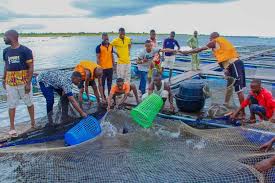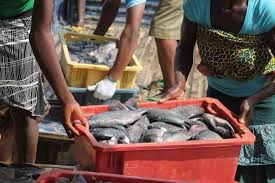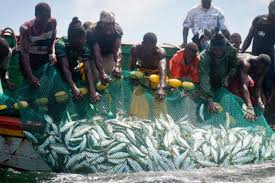Nigeria possesses a vast fisheries resource base, comprising inland and marine fisheries. Various institutions, including federal, state, local governments, and non-governmental organizations, are involved in fisheries management, each with distinct responsibilities such as the Federal Department of Fisheries, the Nigerian Navy, among others.
Fisheries Resource Base of Nigeria
Nigeria’s fisheries resource base is composed of:
- Offshore waters between the 30-mile territorial limits and the 200-mile Exclusive Economic Zone (EEZ);
- Coastal waters along the 853km coastline;
- A continental shelf that varies from 2-12 miles off the coast, running from west to east;
- The Niger River Delta;
- Inland water bodies associated with rivers Niger, Benue, their tributaries, and floodplains;
- Natural lakes, reservoirs, and impoundments created for irrigation, hydroelectricity, and water supply.
Fisheries in Nigeria are categorized into
- Marine capture (industrial and artisanal), which includes offshore and inshore industrial fishing, targeting resources five nautical miles off the coast to the edge of the continental shelf, along with coastal and brackish water artisanal fisheries;
- Inland capture, which mainly consists of artisanal fisheries;
- Aquaculture, practiced both commercially and subsistently.
Read Also: How to Control Feeding Struggle among Fishes in the same Pond
Fisheries Administration and Responsibilities in Nigeria

The federal government manages marine resources while inland water resources are managed jointly with state governments. Ministries, including those related to agriculture at the federal level, are headed by Ministers and Ministers of State.
At the state level, Commissioners lead similar structures. The Federal Ministry of Agriculture and Rural Development houses the Department of Fisheries, under the direction of the Director of Fisheries. State Directors of Fisheries also lead corresponding departments in their respective Ministries of Agriculture.
Fisheries Management Institutions in Nigeria
1. The Federal Department of Fisheries (FDF): The FDF is responsible for policy formulation, program development, regulations, and quality control. It is divided into:
i. Fisheries Resources Monitoring, Control, and Surveillance (MCS) Unit;
ii. Fish Quality Control and Assurance Service;
iii. Fish Quarantine Service;
iv. Lake and Lagoon Fisheries Management Unit.
2. The Nigerian Navy: The Nigerian Navy performs various roles, including:
i. Military roles: These roles include force projection and maintaining the balance of power.
ii. Policing role: The Navy ensures law and order within the nation’s territorial waters.
iii. Coastguard duties: It undertakes coastguard functions.
iv. Diplomatic roles: It is involved in foreign policy negotiations and diplomatic prestige.
Established by the Parliamentary Act No. 21 of 1964, the Nigerian Navy was tasked with:
- Naval defense of Nigeria;
- Enforcement of customs, fishery, and immigration laws;
- Training in naval duties;
- Conducting hydrographic surveys and promoting safety in territorial waters and the EEZ.
3. National Agency for Food and Drug Administration and Control (NAFDAC): NAFDAC, established by Decree 51 of 1993, oversees the regulation and control of the manufacture, importation, exportation, distribution, advertisement, sale, and use of food, drugs, cosmetics, chemicals, detergents, medical devices, and packaged water.
4. The Nigerian Ports Authority (NPA): Before privatization, the NPA’s duties included port development, safe and navigable channels, cargo handling, and ensuring safety and security. Post-privatization, its role involves:
i. Administering land and water within ports;
ii. Planning and developing port infrastructure;
iii. Leasing port infrastructure;
iv. Monitoring and enforcing port regulations. Functions like cargo handling and equipment acquisition have been transferred to the private sector.
5. The Federal Ministry of Transport: This Ministry is tasked with policy formulation, planning, legislation, and international relations concerning basic marine infrastructure.
6. The Inland Waterways Department: Established under Decree No. 13 of 1997, this department manages Nigeria’s inland waterways, which include rivers Niger and Benue, creeks, lagoons, lakes, and intra-coastal waters. It provides leadership in developing intermodal transport facilities in line with global best practices.
Read Also: Complete Guide on Treatment of Livestock Diseases
Fisheries Research and Training Institutions in Nigeria

1. Nigerian Institute for Oceanography and Marine Research (NIOMR), Lagos: NIOMR conducts research on the resources and physical characteristics of Nigeria’s territorial waters and the high seas. Its responsibilities include studying fish species abundance and distribution, aquaculture improvement, marine pollution prevention, and the impact of global climate change on marine environments. NIOMR also provides technical training in fisheries.
2. National Freshwater Fisheries Research Institute (NIFFR), New Bussa: NIFFR’s mandates involve genetic improvement of freshwater fishes, research on aquatic resource distribution, hydrology of lakes, aquaculture development, and ecological studies of man-made lakes. The institute provides extension research services and technical training in freshwater fisheries.
3. Nigerian Universities and Colleges Offering Fisheries and Aquaculture Training: Several universities in Nigeria, such as the University of Ibadan, Lagos, Calabar, Abeokuta, and others, have full-fledged Departments of Fisheries and Aquaculture. In addition, Federal Colleges of Fisheries in Lagos, New Bussa, Baga, and Maiduguri, as well as the Federal College of Agriculture in Ishiagu, offer fisheries-related training.
Professional Fisheries Organisations in Nigeria
1. Fisheries Society of Nigeria (FISON): FISON is a non-governmental organization committed to promoting fisheries’ contributions to Nigeria’s economy and ensuring food security. Its objectives include supporting professional development, fostering interest in fisheries programs, facilitating research, and promoting sustainable investments in the fisheries sub-sector.
Other notable fisheries-related organizations in Nigeria include: Nigerian Trawler Owners Association (NITOA), Catfish Farmers Association of Nigeria (CAFAN), Tilapia Aquaculture Developers Association of Nigeria (TADAN), Nigerian Union of Fishermen and Seafood Dealers (NUFAS), Association of Fish Importers of Nigeria (AFIN), and National Fisheries Development Committee (NFDC).
Do you have any questions, suggestions, or contributions? If so, please feel free to use the comment box below to share your thoughts. We also encourage you to kindly share this information with others who might benefit from it. Since we can’t reach everyone at once, we truly appreciate your help in spreading the word. Thank you so much for your support and for sharing!
Read Also: Underground Water and Aquifers

